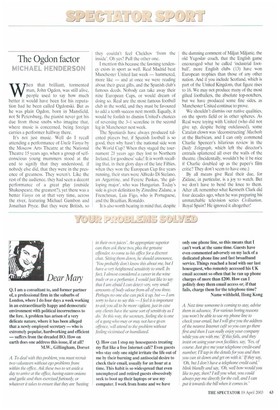The Ogdon factor
MICHAEL HENDERSON
When that brilliant, tormented man, John Ogdon, was still alive, people used to say how much better it would have been for his reputation had he been called Ogdonski. But as he was plain Ogdon, horn in Mansfield, not St Petersburg, the pianist never got his due from those snobs who imagine that. where music is concerned, being foreign carries a performer halfway there.
It's not just music. Well do I recall attending a performance of Uncle Vanya by the Moscow Arts Theatre at the National Theatre 15 years ago, when a group of selfconscious young mummers stood at the end to signify that they understood, if nobody else did, that they were in the presence of greatness. They weren't. Like the rest of the audience, they had seen a decent performance of a great play (outside Shakespeare, the greatest?), yet there was a better Vanya on at that very time, across the river, featuring Michael Gambon and Jonathan Pryce. But they were British, so they couldn't feel Chek.hov from the inside', Oh yes? Pull the other one.
I mention this because the fawning tendency exists in sport as well. Real Madrid beat Manchester United last week — hammered, more like — and at once we were reading about their great gifts, and the Spanish club's famous deeds. Nobody can take away their nine European Cups, or would dream of doing so. Real are the most famous football club in the world, and they must be favoured to add a tenth success next month. Equally, it would be foolish to dismiss United's chances of reversing the 3-1 scoreline in the second leg in Manchester next week.
The Spaniards have always produced talented players but, if Spanish football is so good, then why hasn't the national side won the World Cup? When they staged the tournament 21 years ago they lost to Northern Ireland, for goodness' sake! It is worth recalling that, in their glory days of the late Fifties, when they won the European Cup five years running, their stars were Alfredo Di Stefano, an Argentine, and Ferenc Puskas, 'the galloping major', who was Hungarian. Today's side is given definition by Zinedine Zidane, a Frenchman, Luis Figo, who is Portuguese, and the Brazilian, Ronald°.
It is also worth bearing in mind that, despite the damning comment of Miljan Miljanic, the old Yugoslav coach, that the English game encouraged what he called 'industrial football'. more English clubs (13) have won European trophies than those of any other nation. And if you include Scotland, which is part of the United Kingdom, that figure rises to 16. We may not produce many of the most gifted footballers, the absolute top-notchers, but we have produced some fine sides, as Manchester United continue to prove.
We shouldn't dismiss our native qualities, on the sports field or in other spheres. As Real were toying with United (who did not give up, despite being outclassed), some Catalan clown was 'deconstructing' Macbeth at the Barbican, and I can only commend Charlie Spencer's hilarious review in the Daily Telegraph, which left the director's entrails splattered all over the walls of the theatre. (Incidentally, wouldn't be it be nice if Charlie doubled up as the paper's film critic? They don't seem to have one.) By all means give Real their due, for Zidane, in particular, is a joy to watch. But we don't have to bend the knee to them. After all, remember what Kenneth Clark did four decades ago, when he was preparing his unmatchable television series Civilisation. Royal Spain? He ignored it altogether!


































































 Previous page
Previous page